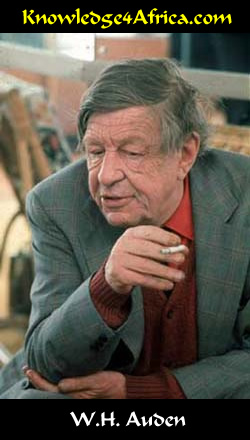|
READ THIS
The poet appears to be suffering the loss of someone close. He calls for a public lament, demanding that
nothing may get in the way of his mourning.
In another sense, however, there appears to be a certain amount of humour in this poem. Is the poet,
then, being sincere or is he making gentle fun of funerals in general?
 ABOUT THE POET
ABOUT THE POET
Wystan Hugh Auden is regarded by many as the most influential poet of the 20th century, a man who
inspired other giants of the poetic world such as C. Day-Lewis, Louis MacNeice and Stephen Spender.
He was born in 1907 in York, the son of a medical practitioner and a university-educated mother. He
attended Oxford University where he graduated in 1928 with a lowly 3rd class degree in Literature.
While at Oxford, he became known for his poetry and his eccentricities and, most notably, for his series
of homosexual relationships.
Auden became a schoolmaster, which later allowed T.S. Eliot to criticise him for allowing his pedantic
teaching style to influence his poetry.
In 1935 he married Erika Mann, a German lesbian who needed to escape from Germany. The marriage
was one of convenience, designed purely to provide her with British citizenship.
During the 1930s Auden became enamoured with left-wing politics and social causes, although he would
later tire of the contradictions inherent in this. Eventually he would claim that politics and art could never
be combined.
In January 1939, shortly before the outbreak of war, he sailed for New York. Because this was seen as
desertion from his homeland which was about to be embroiled in conflict, he lost much of his reputation
in England. As a result, he settled in the United States and eventually took out citizenship there.
While in the United States, he established a permanent relationship with the 18 year old poet, Chester
Kallman, who would become his lifelong companion.
Auden would lecture literature at several universities, including Oxford where his tenure demanded that
he give only three lectures per year. He would die in Vienna in 1973, shortly after delivering a guest
lecture.
Have you looked at the questions
in the right column?
|
TEST YOURSELF!
Read the left column and then answer
the following questions:
He was my North, my South, my East and West,
My working week and my Sunday rest,
My noon, my midnight, my talk, my song;
I thought that love would last forever: I was wrong.

[Need help?]
An oxymoron is a figure of speech or language device in which apparently contradictory terms
appear in conjunction.
|
- Have oxymorons been used in this verse? If so, explain their purpose. (4)

[Need help?]
The poet speaks of a "working week" but "Sunday rest".
He also mentions "my noon" but "my midnight".
The purpose of using the oxymoron is to indicate that the deceased represented the whole world
to the poet, including all the opposites in the world.
|
- The poet says, "I thought that love would last forever: I was wrong". Why is he
wrong? (3)

[Need help?]
Love is always identified as an eternal thing. But the poet here sees mortality as coming in the way of
eternity. The loved-one has died and, with his death, comes the end of love.
|
The stars are not wanted now; put out every one,
Pack up the moon and dismantle the sun,
Pour away the ocean and sweep up the woods;
For nothing now can ever come to any good.
- What is the significance of the stars being "put out every one"? (4)

[Need help?]
The moon and the stars are symbols of love. With death, however, comes the end of love, and therefore
there is no longer any point to the stars.
On the other hand, it is also true that, because his loved-one has died, so have the moon and the stars.
All is darkness, all is sorrow.
With the moon, the stars and the sun being extinguished, one would be plunged into total darkness --
and that darkness would suit the depressed mood of the poet.
|
- Comment on the nature images in this final verse. (4)

[Need help?]
The poet singles out all those things in nature which are symbols of love: the moon, the stars, the sun.
The ocean and the woods too represent the beauty of nature which is especially appreciated by people
in love.
Yet all these things must vanish as the poet mourns the loss of his loved one.
|

[Need help?]
Hyperbole is an exaggeration for effect.
|
- In what way has hyperbole been used in this verse? (4)

[Need help?]
The poet speaks about putting out the stars, packing away the moon, dismantling the sun, pouring out all
the water of the ocean, and sweeping away the woods.
This is all extreme exaggeration and is done to indicate the absolute depths of the poet's sorrow.
|
|



